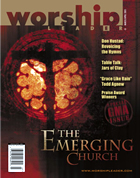
A few of blogs I read,
A Ticking Time Blog,
Cheaper Than Therapy, and
Poet in Motion have all (in one form or the other) commented on Darwinist Evolution and/or Intelligent Design.
So, I thought I’d offer a line of thought that has been running in my mind for the last year (I want to explore this some more, maybe my blogging buddies can help me think this through…this is a topic that I am finding to be constantly in flux as new information flows into my consciousness…)
I went to a seminar about a year ago at a mega-church in my area at which
Philip Johnson spoke (the famous Berkley professor of law who wrote
Darwin on Trial and many subsequent books on the subject and has been a key figure in spurring on the “Intelligent Design” movement). As I listened to him speak and then ate lunch with Christians discussing the topic of Darwinism, I was struck with how anxious they were about disproving Darwinist evolution. I understand the treat they feel it is to Christian faith (especially the developing faith of our children in the public schools)—the scientific community seems to be not only satisfied with scientific inquiry but also the scientific disproving of any divinity in creation. Some atheistic evolutionists seem to have a mandate to rid the world of Neanderthal-like notions of a God (pun intended). The Scopes Monkey Trial seems to be played out over and over again as school boards wrestle with this issue.
(Here in Ohio, the state school board has recently mandated that "Critical Analysis of Evolution," an Intelligent Design lesson plan, be inserted into the Set A science curriculum.) And since it is Christians who are backing the Intelligent Design movement (not only with seminars like the one I attended, but also financially—the Discovery Institute, the main ID group in the USA is financed by wealthy Christians Howard and Roberta Ahmanson), the scientific community is skeptical about it being just a back door to “Creationism” in spite of all the disclaimers by ID scientists that it is not intended to be that.
So, I understand the threat that evangelicals feel. But I also understand that the issue is more complex than simply “evolution versus creation”—which the debate always inevitably collapses to in these Christian discussions (like I had at the Johnson seminar’s lunch table).
A few things I am trying to process:
1. There are Christians who believe that evolution is the process through which God created the universe. While many evangelicals are convinced that we cannot have both evolution and creationism existing side-by-side (since they seem to contradict each other), there are others that offer many other models that can be enlightening to the discussion. I am in the midst of reading and chewing on two such models:
One is from
Brian McLaren (borrowing from N. T. Wright), who says that the Bible does not teach that Eden was “perfect” but that it was “good.” The “goodness” of creation is one which can proceed to develop. Reformed theologians like Michael Wittmer and Paul Marshall tell us that it is wrong to read the Bible through the lens of Greek philosophy (as the Gnostics did), which makes us see Eden as a static place that could not change and develop. They say that the Bible seems to indicate that Eden was actually a place of potentials—as indicated when Adam was commanded by the Lord to “work” the creation and “take care” of it—in other words, to “make it better.” McLaren takes that one further, that the creation itself would develop out of its potentiality that God gave it. The potentials that we read at the end of the Genesis creation account perhaps indicates how to read the verses before that—that God, in the creation days, was showing us the process of creation that could be read as the account of evolutionary progression.
Another model is from
Theistic Evolutionists, like Kenneth Miller (I’m currently reading his book, Finding Darwin’s God. Miller explains the difference between evolution as validated scientific fact and as an evolving theory, and is even critical of his colleagues in science who espouse a materialistic, agnostic or atheistic vision of reality). Theistic Evolutionists (though not Miller, as I’m reading him) often claim that science and theology can co-exist, because they exist in two separate spheres of inquiry. Science deals with that which can be observed and explained objectively; theology deals with that that which cannot be observed and explained objectively. Science tells us “what;” Theology tells us “why.” When one of these crosses over in the realm of the other, that’s when we have our troubles. (I don't care for this this view of the separation of spheres because I think we are called to holistic thinking of reality, not compartmentalized thinking…)
2. There are Christians who believe that evolution is a deeply flawed theory and that we need to take a stand against it. This is a more nuanced view—it’s not just about the Darwin vs. Creation debate. It’s about truth.
They are troubled by a scientific community that is insistent that their theory is more than just a theory, but is actually true. So true, in fact, that the theory has seeped into just about every area of scientific inquiry—it seems that someone cannot do science today without including in their analysis something to do with evolution. (Darwinism is so “true,” in fact, that we have allowed it into other arenas—
Economic Darwinism tells us that the poor should suffer in a capitalistic system;
Eugenics tells us that weaker humans should be allowed to pass away, etc.) There seems to be a resolve in the scientific community to make evolutionary theory the basis of all sciences, and to defend it from all challenges. This rubs truth-seekers the wrong way (these “truth-seekers” are often Christians, but not always—there has been a large uprising within the scientific community against this). Truth-seekers question an establishment that does not allow scientific review and legitimate criticism of the theory of evolution. It seems that the establishment is more interested in explaining and defending the theory rather than criticizing it.
3. Postmodernism may be the route out of this conflict. As I sat there at lunch listening to Christians trying to come up scientific strategies to counter evolution, I thought, “There’s coming a time when Darwinism will simply die out under the weight of postmodernism.”
a. Darwinism is a product of the modern era, when Descartian and Newtonian ideas ruled the roost. Darwinism presumes that we can study things objectively, and that the universe is governed by laws of regularity that our human minds can understand. Postmodernity calls these presumptions into question.
b. Newtonian Physics is giving way to Quantum Physics (String Theory), in which we can (and must) make inferences beyond what we can actually observe “objectively.” I have just started reading The Elegant Universe by Brian Greene on superstrings and hidden dimensions. Doug Pagitt (a key leader in Emergent) has been looking into Quantum Physics as well, saying that he suspects that “as the Protestant Reformed expression of Christianity was to Newtonian science…so is the Emergent church expression of Christianity [is] to Quantum science.” This could be very interesting to watch develop.
c. Postmodern philosophers like Michel Foucault teach us that every influential interpretation is put forward by those in power, and power often corrupts the interpretation for the benefit of those in power. The scientific community (a group that whole-heartedly embraces evolution) has the power, and since power is a corrupting force (yes, even in science!), then we must call into question their interpretation of reality.
d. Richard Rorty has taught us that we cannot dispassionately interpret reality scientifically. The idea that we can separate the subject (me) from the object studied is a fallacy; there really is no such thing as objectivity. Our interpretations are always clouded by our preconceived ideas, and then we simply search for ideas that are cohesive with these preconceptions. So, the modern definition of science may need to give way to a different definition that includes the reality of this subject/object relationship. Until evolutionists accept that they are always allowing their preconceptions about the validity of Darwinist theory cloud their conclusions (rather than insisting that they are merely being “objective”), we can legitimately call into question their conclusions.
e. Christians in the modern world have used modern methods of apologetics to refute modern ideas opposing a Christian worldview. That was great; it worked pretty well for most of the 20th Century. And this is the key thing that strikes me about the debate about Intelligent Design: It is a modern method of apologetics. As we experience the postmodern turn, however, our apologetics will need to be move beyond being based solely on using modern scientific methodology. Rational arguments will still be needed (postmodern does not mean “anti-modern,” it just means “after-modern”), but the rational, scientific arguments will need to include the above-mentioned postmodern sensibilities as well. And as postmodernity influences science and (as I predict) allows scientists to include in their inquiries ideas that are beyond merely the observation of the four dimensions and only employing materialistic and naturialistic causes (as the modern definition of “science” says) then our apologetics will depend more on what is not scientifically proven in that modern sense and move beyond that to the matters of faith in the unseen. I think, in fact Intelligent Design is the stepping stone towards that future.
3. So, IMHO, the debates between Darwinism and ID are a product of the modern era. This is not to say that they are not legitimate to have, and do not have value. Truth-seeking is always a good thing.
However, I look forward to a new definition of “science” that includes the ability to make inferences beyond that which can be “observed.”
I look forward to a science that realizes that “objectivity” is a fallacy.
I look forward to when Christians no longer use modernistic methods (like Newtonian Science and Descartian philosophy) to seek to prove the existence of God.
And I look forward to when we can begin to view all of life holistically and can see that Jesus is Lord of all—of science and philosophy and not just my own individual personal faith.










 It seems that more blogs than not are written in such a way that gives rise to contention—the blogger comes from a distinct theological or political or ideological perspective, and the posts are his or her opportunity to rail away at the people who disagree with that perspective.
It seems that more blogs than not are written in such a way that gives rise to contention—the blogger comes from a distinct theological or political or ideological perspective, and the posts are his or her opportunity to rail away at the people who disagree with that perspective.